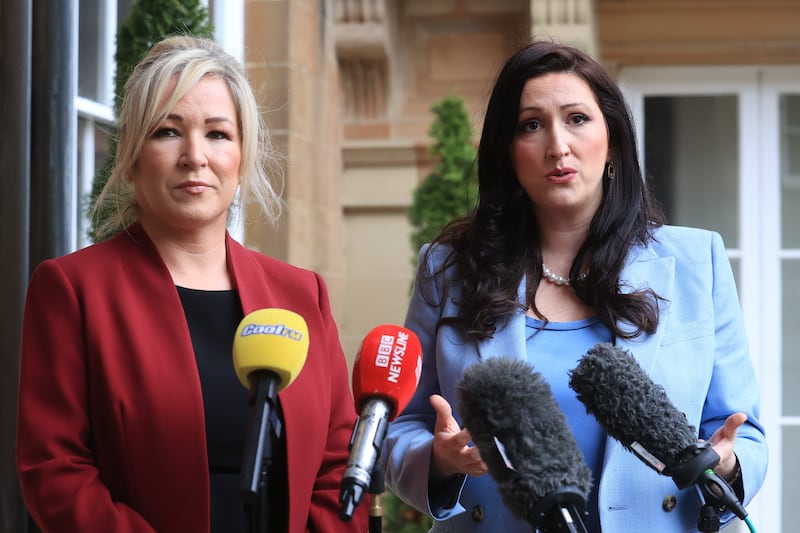So farewell then, unionism. You were once a colossus bestriding the north’s political landscape, electorally almighty and administratively all powerful. Now you have been reduced to a squabbling rabble (tweeted live to the world) ultimately fragmented by, of all things, a follow-on from the Treaty of Rome. (Yes, it’s a bit of a grandiose introduction, but you get the idea.)
By admitting that he failed to achieve all the changes he promised to the Windsor Framework, Jeffrey Donaldson has divided the DUP, weakened its electoral ability and undermined the credibility of unionism as a whole. There may never be a unionist First Minster at Stormont again.
In fairness Jeffrey got his party executive to agree to a deal before they read it. (Possibly a technique learned from Sinn Féin.) As it turned out, the deal was just another impenetrable fudge in the style of the Good Friday Agreement.
Although unionism’s current collapse has been triggered by the Windsor Framework, its difficulties run much deeper. Present events have merely laid bare a problem from the past. Welcome to a salutary lesson in the art of failure.
The difficulty with unionism is that it has never developed a coherent body of thought or theory which might bind it together into something resembling a normal political movement. It has yet to reach an agreed definition of what unionism means. Besieged by its pursuit of constitutional purity, it splinters every time it has a decision to make.
All that has happened is that they have changed the wallpaper in Stormont. It will not cover its structural defects or undo the collapse of public services. It is significant only to those who believe wallpaper is important
Unionists advocate union with Britain, but only on their own terms. They do not want union with mainstream, modern Britain. They just want union with the Daily Mail. Its right-wing, royalist sentiments reflect unionism’s Disneyesque view of Britain: kings, fairy-tale princesses and palaces guarded by soldiers, who regularly go abroad to give Johnny foreigner a good hiding.
(It’s no coincidence that the UUP keeps choosing candidates who served in the British army).
If you disagree with this, have you ever met a left-wing unionist, or do you know of one who is anti-royalist? About 45 per cent of the British public believe that the monarchy should be abolished or that it is unimportant. A similar percentage of unionists might reasonably be expected to share that view. It is hard to find any who do.
As British society evolved, unionism stood still, frozen in the myths of medieval England and fuelled by an inflexible interpretation of post-Reformation Protestantism.
While all that is harmless to some extent, unionism used its power after 1921 to discriminate against Catholics, gerrymander electoral boundaries and impose repressive legislation. It all proved counter-productive in the end.
- Standing with Palestine, while sitting down with America – Patrick MurphyOpens in new window
- How has the DUP led unionism into decline, while Sinn Féin has guided nationalism into sectarian ascendancy? – Patrick MurphyOpens in new window
- Patrick Murphy: Stormont isn’t working because the Good Friday Agreement isn’t working - we need a new system of governmentOpens in new window
That outdated attitude survives to a large extent today, with some honourable exceptions. The most notable has been Robin Swann, by far the most impartial (and capable) minister in the last Executive. Unionism would have survived and even thrived if it had contained more politicians with his decency and dignity.
While a significant crime of unionism was to discriminate against Catholics, an equal wrong was to deprive its own working class of an education - both in the formal sense by retaining academic selection and informally by telling them that bonfires and marching bands constituted culture.
The level of educational underachievement among young Protestant males today is a shameful reflection on unionists’ betrayal of what they call their own people.
Those of us who first challenged unionism’s undemocratic governance through the civil rights movement generally believed that its sectarianism was unsustainable. We were right. We thought it would be replaced by a non-sectarian society. We were wrong.
All that has happened is that they have changed the wallpaper in Stormont. It will not cover its structural defects or undo the collapse of public services. It is significant only to those who believe wallpaper is important.
The good news is that unionism has gone as the dominant sectarian force in government. The bad news is that it has just been overtaken by a new sectarian arrangement.







